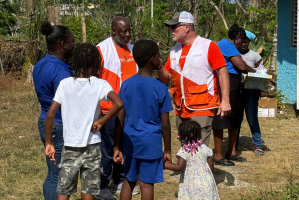Finding Pain's Purpose
Why did no one recognize or acknowledge her pain? That is the mystery that haunted Renee as a child and well into her adult years. Why had every adult in her life failed to step forward and ask the tough questions about the horrors playing out every evening in her home?
Teachers, friends, neighbors, bus drivers, and relatives seemed oblivious to the fact that Renee trudged through her childhood and adolescent years in a foggy haze of exhaustion and depression. Were they oblivious that she’d practically slept through the third, fourth, fifth and sixth grades -- straining to keep her eyes open? Was their silence an indication of their uncertainty about how to help? Or, were they so distracted by their own pain that they couldn’t see hers?
Renee’s parents split up when she was two years of age. That was the last Renee would see of her biological mother for more than twenty years. She and her older brother were left with an abusive alcoholic father who tormented the family with daily acts of violence. The soundtrack of Renee’s formative years included breaking dishes, slamming doors, hitting, cursing and death threats.
Renee’s father claimed a new victim when he married her step-mother. This meant there was someone new to bully, hit, coerce and humiliate. Renee says a part of her, as a young child, died a helpless spectator…witnessing daily beatings but unable to intercede and afraid to call out in defense of this woman – the only mother she knew.
Every night when her father stumbled into the house, swaying from side to side, the smell of alcohol permeating his clothes, skin and breath, Renee cried out to God asking Him to take her father. She prayed he would never come home.
No one in the world - so young - should know a world so cruel. Why does God allow situations like this to play out in families across the globe? Why do blameless children endure unspeakable pain? It’s a tough question and one that’s often asked: If God is love, why does He allow evil to flourish amongst us?
The answer begins with the beginning of man. Sin and death became a reality for man when Adam and Eve chose to eat from the forbidden tree. Evil came into the world because man chose to disobey God at the urging of the devil. Thus we are left with a fallen world and man will always experience pain and drama in our lives because of sin.
When you experience pain, you have two response options. They are both directly related to how you define yourself. You can allow the negative nature of pain caused by rejection, tragedy, or misfortune to define you as weak, a failure, or not good enough. This was Satan’s accusation about Job. If you choose to allow pain to define you in these terms, you will probably not see God’s way out of the pain. Even if someone walked up to you with God’s solution, you wouldn’t believe it would work. You would already have accepted the devil’s label for you: “loser.”
The second potential response to pain is to define yourself as a courageous victor by identifying yourself as belonging to God. You can acknowledge that He loves you and has never forgotten you. You can label yourself as someone who is in the middle of a lesson that involves pain as a tool to sharpen your reliance on the Lord. If that is who you are, it will be clearer to you how God will help you exit from the painful situation.
Renee chose the latter. She sought out lessons from her years of heartache and sorrow. She knows God protected her life, her sanity and above all else her faith for a reason. The purpose of the pain was for her to use her story and talents to help others. The purpose of the pain was for her to learn the true meaning of forgiveness. The purpose of the pain was to show her that the Lord brings comfort even in the midst of life’s most violent storms.
Knowing who you are will not protect you from ever being hurt by pain. However, knowing you are a child of God gives you the necessary preparations to follow His plan for your life. No matter what pain you experience, hold on to who God made you and look to Him for how to respond.
Choose a painful situation you are going through and ask, “How is my pain trying to define me?” Compare that label to who the Bible says Christians are, such as members of the body of Christ (1 Cor. 12:13), a holy priesthood (1 Peter 2:9), Jesus’ brothers and sisters (Mark 3:35). Finally, based on your biblical identity, write down how you will respond to the painful experience.
You and the whole world will discover what kind of Christian you are …the minute you’re put in hot water. Hard times always define the strength of our faith and character.



























